Last December, Livable City put forward our Action Plan for Housing, a set of complementary strategies for making San Francisco a more livable, sustainable, and affordable city.
We aimed to address San Francisco’s unprecedented housing crisis by putting forward a set of strategies for preserving existing housing and protecting tenants, while increasing the supply of housing that is affordable, well-designed, and located near transit.
One year on, our Action Plan has scored many major successes.
Protecting Existing Housing
Early in the year, we helped craft an ordinance that strengthened protections against the loss of rent-controlled and affordable units to merger, conversion, or demolition. A companion ordinance permitted legal units that exceed current density limits to be improved and even enlarged, so long as the building itself is not enlarged. This ordinance affected over 50,000 units citywide. We worked as part of a coalition to create a path to legalization for tens of thousands of existing housing units built without permits over the past fifty years. All of these ordinances included provisions to protect existing tenants against speculative evictions.
Incentives for Affordable Housing
State law requires incentives for affordable housing projects, and for market-rate projects that increase the number of affordable units or make units more deeply affordable. We worked to exempt affordable units in projects that are 20% or more affordable from density limits. This provision allows affordable developers to add more units to projects if they can meet the other requirements of the code, and provides an incentive for more tax-credit projects that are 20% or more affordable. We are working with the City’s Housing Working Group to strengthen other affordability incentives.
Legalizing Car-free Housing
Nearly a third of San Francisco households live car-free. An overwhelming majority of new households and existing households in transit-rich neighborhoods live car-free. Car-free housing costs less than housing with parking, generates less traffic, and enhances the City’s walkable character – and on-street parking – by eliminating the need for driveways and garage doors. Yet housing without off-street parking is not permitted in three-quarters of the city. We worked to permit car-free housing in our most walkable and transit-rich areas, and this year minimum off-street parking requirements were removed from several major transit corridors, including Van Ness, Divisadero, Fillmore, Stockton, Columbus, and The Embarcadero.
Permitting New Housing in Existing Buildings
Adding housing to existing buildings is great way to add housing to neighborhoods while preserving their character and history. Adding housing to existing buildings is greener – the energy and resources embodied in these building is conserved, and new units take advantage of existing investments in structure and infrastructure. New units in rent-controlled buildings are rent-controlled, so allowing new units in existing buildings can grow the city’s rent-stabilized housing stock over time.
 This year, we championed Planning Code changes that ease the conversion of historic buildings and buildings housing nonconforming uses to housing. A pilot project to permit new ‘in-law’ units in the Castro neighborhood was enacted. As mentioned above, relaxing parking requirements in neighborhoods can enable new units in existing buildings in those neighborhoods. An ordinance permitting new units in buildings undergoing earthquake safety retrofits was introduced earlier this year, and will be heard by the Planning Commission early in 2015. This provides an incentive to building owners to retrofit their buildings while adding rent-controlled housing.
This year, we championed Planning Code changes that ease the conversion of historic buildings and buildings housing nonconforming uses to housing. A pilot project to permit new ‘in-law’ units in the Castro neighborhood was enacted. As mentioned above, relaxing parking requirements in neighborhoods can enable new units in existing buildings in those neighborhoods. An ordinance permitting new units in buildings undergoing earthquake safety retrofits was introduced earlier this year, and will be heard by the Planning Commission early in 2015. This provides an incentive to building owners to retrofit their buildings while adding rent-controlled housing.
Taken together, these measures protect as many as 100,000 existing units and permit the creation of many more units new and existing buildings.




